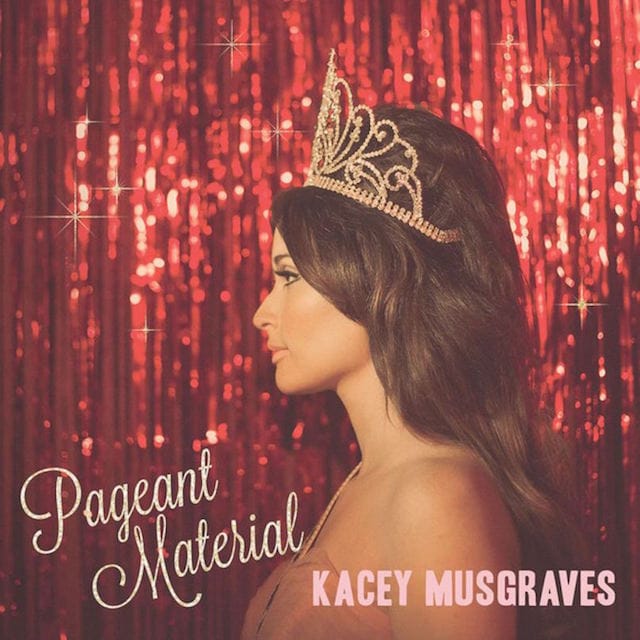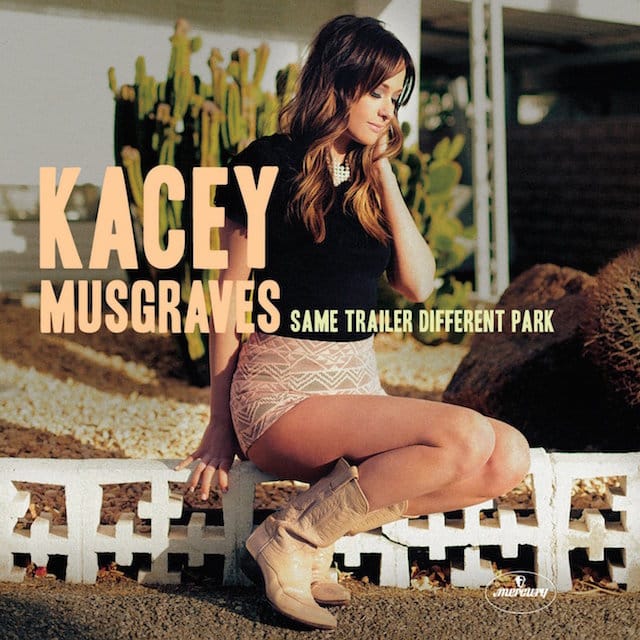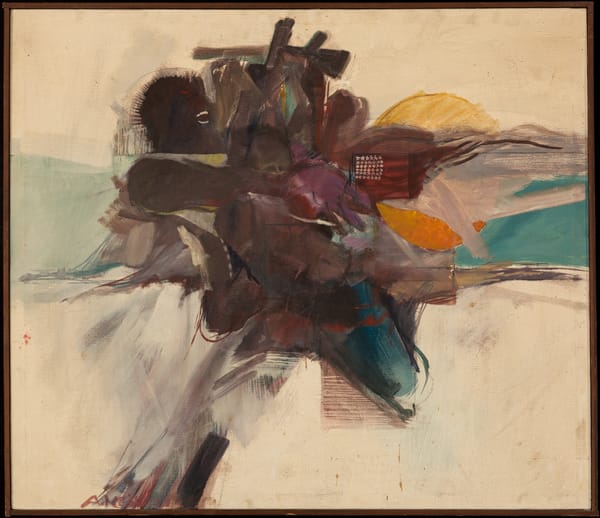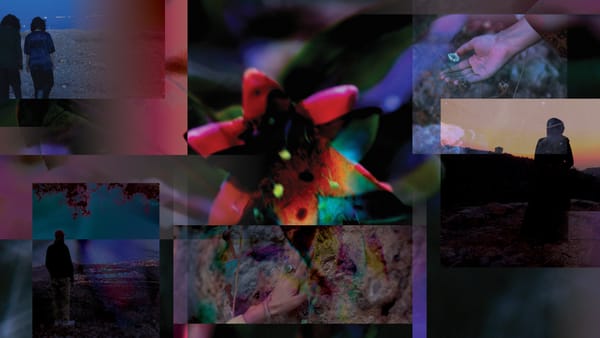Kacey Musgraves, Ouroboros
“I ain’t pageant material,” declares country songbird Kacey Musgraves on the title track to her new album, but the song’s too pretty, too demure, too well-mannered.

“I ain’t pageant material,” declares country songbird Kacey Musgraves on the title track to her new album, but the song’s too pretty, too demure, too well-mannered. Airy guitar saunters through a coy, conventional tune that could warm the heart of any Nashville traditionalist fond of good old songform. Maybe the lyrics attack beauty pageants and avow a wild streak on Musgraves’s part that could potentially disqualify her from winning one, but she sings so sweetly and politely she convinces you of the opposite. That streamlined melody? That sly, kitschy violin shading? That clear, speechlike, mannerly singing voice? Sure sounds like Miss Congeniality to me.
“Pageant Material” typifies a certain brand of song Musgraves might as well have trademarked by now, in which repressive cultural institutions are attacked by way of praising live-and-let-live and/or achieve-your-dreams and/or be-true-to-yourself ideology. She became known for “Merry Go Round,” a scathing indictment of small-town life, and “Follow Your Arrow,” a warm endorsement of tolerance and personal liberty — two infamous 2013 singles that gained her the reputation of Country Music’s Official Progressive and catapulted her 2013 debut, Same Trailer Different Park, into a level of critical acclaim unheard of in her genre, whose corporate stars can sell millions of records within the confines of a restricted, nearly ghettoized Southern working-class market share while barely scratching the world outside. Same Trailer Different Park, a light, catchy record dominated by friendly acoustic plucking and an aesthetic generally folksier than the pumped-up electric blast that currently defines country radio, won rave reviews from specialized country publications and more general music magazines alike, finished tenth in The Village Voice’s influential year-end Pazz & Jop Critics Poll, and was certified gold by the RIAA; her new Pageant Material, out since June, an even lighter, catchier record featuring a similar guitar style plus an increased quotient of string/pedal-steel counterpoint, is poised to do the same. While the new album lacks a declaration of principle as biting as “Merry Go Round,” not to mention an inspirational anthem as rousing and sturdy (and, admittedly, preachy) as “Follow Your Arrow” (although “Biscuits” comes close), it clicks more precisely and confidently into a whole: in a way, every song is an inspirational anthem. Songs describing, criticizing, and reluctantly praising the tiny Texas town where she grew up abound, as do songs with stupendous tunes made for instant, uncontrollable humming.

When Same Trailer Different Park was released, what stood out was Musgraves’s ostensibly progressive worldview; two years later, what marks Pageant Material is the moralizing, homiletic complacency with which she delivers said worldview. Even by the standards of a genre crazy about precious, shallow songs with cutesy morals, packaged in pastoral-themed wrapping paper with a bow on top, Musgraves likes to preach, especially if she can throw in a corny metaphor or two. Twisting familiar clichés into new turns of phrase, touching on homely concrete details that evoke an idealized, nonspecific rural town even if that town is based on Golden, Texas, stripping away figurative language and leaving only universal abstraction when she wants to make a big statement, she seems preserved in the glowing amber of the glossiest, most exquisite twang-bounce backup her band can muster, the same rosy little American Girl Doll world as, say, pre-sellout Taylor Swift, only more explicitly country-identified and hence operating in an instructional rather than confessional mode. Even when her songs take the first person, she presents herself as a role model, an example whose behavior should be emulated, a smart authority figure whose advice should be followed. There’s the song about how you can’t be everybody’s cup of tea, the song about minding your own biscuits and life will be gravy, the song recommending we love hard live fast die fun, the song about staying true to your family, the song about staying true to your hometown, the song attacking corruption in the music industry (“Cigars and handshakes”), arrrrrgh, and the sanctimony goes on. Some of these songs are haughtier than others, and they’re all fairly charming regardless. But Musgraves qualifies as Country Music’s Official Progressive only if we allow the Official Progressive to work in a received, stale, conservative form — specifically, the kind of ethical directive song long since popularized by scheming honchos of the country music industry playing to a reactionary audience.
Were this the whole of Musgraves’s persona, she’d be unlistenable, a goody-goody scold wagging her finger and chiding her fans, “If you ain’t got nothing nice to say, don’t say nothing at all” (an actual lyric, from “Biscuits”). Fortunately, she compensates with humor, wordplay, backbone, bright irrepressible cheer, an uncommon refusal to exaggerate her Southern accent and thus an avoidance of the sassy-country-girl stereotype in favor of a more colloquial, ordinary, all-American singing voice, and the ability to construct friendly country-pop songs that awaken a ravenous craving in your ears until you hear them again. Same Trailer Different Park was plenty tuneful, but Pageant Material cranks the formal pop mastery up several notches; the album’s a veritable jewel of melodic craft. Radiant, jangly electric riffs accentuate straightforward acoustic strumming as shimmering pedal steel seeps through, imbuing the music with a warm, sharp glow as light shades of violin/fiddle fill in the blank spots with a layer of artificiality/gentility that’s crucial to the tone. Neat, breezy, almost plastic in their chirpy lightness, these songs don’t rock, exactly, moving instead with a soaring elegance that emphasizes melodic shape as well as vocal phrasing. There’s a simple, happy pleasure to her singing, a refreshing elated quality, sweetening songs that would otherwise come across sappy — she keeps uttering these trite homilies, but she’ll sing them in such a fetching way, or she’ll back them up with a fabulous guitar lick, and the whole song, moral included, becomes impossible to shake. Highlights include the rolling riff on “Dime Store Cowgirl”; the sunny whistling on “High Time”; the mocking, ominous drumbeat on “This Town”; a glorious chord progression on “Die Fun” that I keep expecting to morph into the Smiths’ “Bigmouth Strikes Again” but then curlicues off in a totally different direction; a glorious chord progression on “Biscuits” heightened by the dainty way she pronounces the word “gravy”; and I could go on. Even “Somebody to Love,” a cozy little collection of generalized truisms, is lifted from its platitudinous seat when the melody starts to climb and unfold, so that the truisms accrue a kind, open-hearted, inspirational truth value.
The puzzle behind Musgraves’s music is that despite her conservative form, the sentiments are indeed liberal, at least socially: she advocates smoking weed, sleeping around, and generally favors personal autonomy. Beyond “Pageant Material” itself, “Good Ol’ Boys Club” might target the Country Music Association and might target the entire privileged economic class, “This Town” definitely slams the small-town mentality even as it pays affectionate tribute, and “Biscuits” promotes a kind of tolerance singers in her genre usually condemn. In terms of style, her phrasing is received and often banal, but in terms of meaning she criticizes the attitudes usually responsible for such received banality; in corny, clichéd language, she opposes the very notion of a cliché; she sings advice songs that advise against advice songs. Her content consistently and explicitly attacks her form, like a dragon champing down on its own tail. Theoretically, this could leave her nowhere, but in fact she gets it both ways — her fresh worldview makes her traditional, constricted music rather more compelling, while the music’s traditionalism adds emotional resonance and human warmth to the worldview. Such an apparent contradiction between form and content makes this country music like none other, ensuring a dizzy, circular dialectical tension that, even as the album floats on by like the summer breeze, makes Pageant Material hit with immeasurably more impact than the louder, tougher, dumber arena-rock prevalent in Nashville nowadays, not to mention anybody’s idea of modern folk-rock. The album revitalizes the genre of the advice song by attacking the genre, turning its own negative and/or condemnatory qualities on itself; it reinvents the genre while sticking to musical fundamentals that, theoretically, should make such a reinvention impossible. It’s preachy, indeed, but it’s also magically uplifting. It’s pretty, hooky, crafted with expertise and care. It’s a brave critique-embrace of genre conventions whose charms constantly lock horns with their shortfalls. It’s the most pleasurable singer-songwriter record I’ve heard in years. Country music rejecting significant portions of its Nashville heritage, it devours itself and erupts in flame, reborn as a totally different, equally intriguing, marvelously captivating animal. Every song will make you grin, tap your foot, and think hard about formal strategy.
Pageant Material (2015) and Same Trailer Different Park (2013) are available from Amazon and other online retailers.





